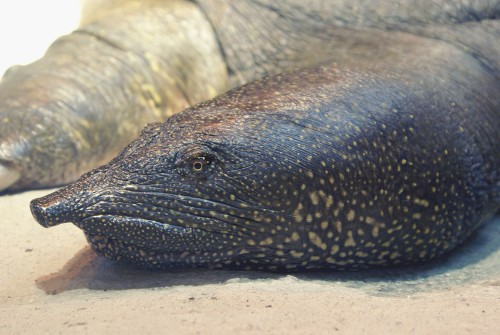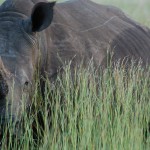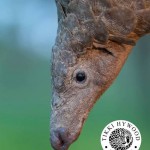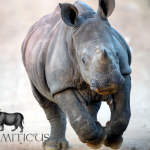
A surge in Chinese consumption of Africa’s softshell turtles has prompted a proposal to list six softshell turtle species in CITES Appendix II. Parties to CITES will vote on the proposal in South Africa at COP17.
China’s attention turned to Africa’s softshell turtles following the last COP in 2013, when 47 freshwater turtle species were granted stronger CITES protection – including ten Asian softshell turtle species. Now that Asian turtles are increasingly scarce in the wild and have stronger CITES protection, turtle traffickers are targeting the African continent. If this sounds familiar, it’s because we’ve already seen what China’s insatiable appetite has done to Asian rhino and pangolin species – and what it’s doing now to their African counterparts.
“As Asian softshell turtle species are depleted and as their trade is increasingly regulated and restricted through CITES and domestic measures, the trade has started to shift to other turtle sources in the US, Africa, and Middle East to meet the commercial demand.”
Unfortunately, softshell turtles are mercilessly hunted for their meat and cartilage. In fact, of 13,000 metric tonnes of Asian turtles exported *each year* from South and Southeast Asia to East Asia in the late 1990s and early 2000s, Asian softshell turtles represented the “biggest proportion”.
Although some domestic measures are currently in place to protect African softshell turtles, these have proven inadequate to stop the onslaught of international trade.
The West African country of Togo is submitting the proposal in French and the United States is submitting it in English. The co-sponsors of the African softshell turtle proposal are Burkina Faso, Chad, Gabon, Guinea, Liberia, Mauritania, and Nigeria. Iraq, Israel, and Turkey have also expressed support for this proposal.
The six softshell turtle species proposed for inclusion in CITES Appendix II:
- Nubian Flapshell Turtle (Cyclanorbis elegans). Native to Benin; Cameroon; Central African Republic; Chad; Ethiopia; Ghana; Nigeria; South Sudan; Sudan; Togo.
- Senegal flapshell turtle (Cyclanorbis senegalensis). Native to Benin; Burkina Faso; Cameroon; Central African Republic; Chad; Côte d’Ivoire; Ethiopia; Gambia; Ghana; Guinea-Bissau; Mali; Mauritania; Nigeria; Senegal; South Sudan; Sudan; Togo.
- Aubry’s flapshell turtle. (Cycloderma aubryi). Native to Angola; Central African Republic; Democratic Republic of the Congo; Congo; Gabon.
- Zambezi Flapshell Turtle (Cycloderma frenatum). Native to Malawi; Mozambique; Tanzania; Zambia; Zimbabwe.
- African Softshell Turtle (Trionyx triunguis). Native to Angola; Benin; Cameroon; Chad; Democratic Republic of the Congo; Congo; Egypt; Equatorial Guinea; Eritrea; Ethiopia; Gabon; Gambia; Ghana; Guinea; Guinea-Bissau; Israel; Côte d’Ivoire; Kenya; Lebanon, Liberia; Mauritania; Namibia; Niger; Nigeria; Senegal; Sierra Leone; Somalia; South Sudan; Sudan; Syrian Arab Republic; Tanzania; Togo; Turkey; Uganda.
- Euphrates Softshell Turtle (Rafetus euphraticus). Native to Iran, Iraq; Syrian Arab Republic; Turkey.
In addition to the six African species, the United States will list its native Florida softshell turtle (Apalone ferox), smooth softshell turtle (Apalone mutica) and spiny softshell turtle (Apalone spinifera) in CITES Appendix III, which is not subject to a vote of the Parties to CITES. This means that the U.S. is requesting the cooperation of other countries to prevent unsustainable or illegal trade, and any international trade requires appropriate documentation.
The Chinese softshell turtle (Pelodiscus sinensis) is intensively farmed in China and not protected by CITES. However, the IUCN Red List Assessment notes, “wild populations continue to be exploited for food and possibly farm founder stock, resulting in a decline in abundance throughout its wide range.”
The question remains whether or not the CITES Appendix II listing will be sufficient to protect Africa’s softshell turtles from the rising tide of international trade – which ultimately flows to turtle-consuming China.
If properly implemented, then presumably, CITES Appendix II ensures that trade (whether one agrees with turtle trade or not) will remain sustainable.
However, if corrupt elements infiltrate the CITES authorities in range states and issue bogus permits or if legal trade is used a front for illegal activities (captive breeding for commercial trade comes to mind) or if enforcement is lax or if turtle traffickers aren’t deterred by meaningful prison sentences, then Africa’s softshell turtles will continue to be plundered until there is almost nothing left to protect. The final recourse will be to transfer the African softshell turtles to CITES Appendix I and halt all international trade. Based on what the authors of the proposal have stated, these species do not currently meet the criteria for an Appendix I listing.
For now, the best case scenario is that the Appendix II proposal will receive the required number of votes to pass *and* that subsequent efforts on the ground – augmented by global awareness, education, and demand reduction – will save the day for Africa’s softshell turtles.
Help fight against wildlife trafficking: Support our work to advocate for the protection of endangered species at the upcoming CITES CoP17 in South Africa.




